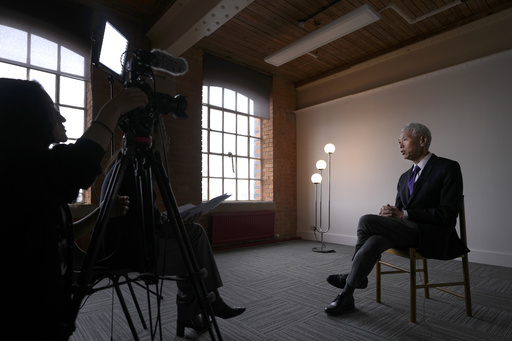
LONDON — Singapore has seen a notable increase in repression and corruption over the past decade, as indicated by the youngest son of the late former Prime Minister Lee Kuan Yew, who has sought asylum in the United Kingdom claiming systematic persecution against him.
Lee Hsien Yang, who has received political refugee status in the U.K., explained that the government of Singapore has turned its laws against dissenters into tools for suppression. He highlighted that he is merely one among a growing cohort of Singaporeans fleeing the country in search of safety from their own leadership.
In a recent interview conducted in London, Lee pointed to the increasingly strict regulations regarding security and public assembly, alongside a significant rise in the number of asylum seekers from Singapore in recent years, particularly under the governance of his estranged brother, Lee Hsien Loong, who served as Prime Minister until his recent resignation.
“While Singapore presents itself as a wealthy, democratic nation, this facade conceals a regime that is quite oppressive,” he stated. “Beneath the surface, many are escaping from it.”
In response to Lee’s allegations, the Singapore government issued a stern rebuttal, asserting that he was utilizing a “personal vendetta” to malign his family and the nation internationally. They contended that Lee’s claims in his asylum petition implied a campaign of persecution aimed at preventing his son, Li Shengwu, from aspiring to the Prime Minister’s position, despite Li’s repeated assertions of disinterest in such ambitions.
Last week, Lee Hsien Yang disclosed that he had to apply for asylum due to baseless legal actions and constant surveillance imposed by his brother’s administration, which has led to widespread civil unrest and dissent. Human Rights Watch has raised alarms over the stifling of free speech in recent elections, highlighting the harsh enforcement of a “falsehoods” law that supposedly restricts online expression.
The Lee brothers have been in conflict since they disagreed over the inheritance of their late father’s estate. Lee Kuan Yew, who passed away in 2015, was known for his authoritarian rule while simultaneously being credited with transforming Singapore into a leading global financial center. Despite stepping away from direct governance in 1990, he continued to wield significant influence until his death.
Singaporean authorities have accused Lee Hsien Yang and his wife of perjury regarding their father’s will, and Lee claims his son faced prosecution for remarks made about the judiciary on social media. The elder Lee was previously ordered to pay damages for defamation concerning allegations of corruption against two government ministers linked to the rental of government properties, which he stated he has now settled to safeguard his family’s assets.
Lee characterized the actions taken against him as “baseless and unwarranted,” asserting that his troubles intensified following his affiliation with an opposition party in 2020. He and his wife decided to leave Singapore in June 2022, ultimately seeking political asylum in the U.K. out of fear for their safety.
“Some people dismiss this as a mere family dispute, but the reality is that these actions are a manifestation of state power,” he noted.
“In a tightly regulated environment like Singapore, where my brother was at the helm, it is inconceivable that such occurrences transpired without his knowledge or agreement,” he continued.
Lee alleged that Singapore’s financial institutions have increasingly been implicated in international money laundering and corruption scandals. Last year, authorities in Singapore confiscated approximately $1.75 billion in assets in a sweeping case linked to illicit funds, resulting in the arrest of several Chinese nationals.
He also pointed to the entanglement of Singaporean banks in the notorious 1MDB corruption scandal in Malaysia and highlighted the involvement of state-linked companies in Brazil’s “Operation Car Wash” anti-corruption probes.
Lee argued that these incidents, alongside the growing authoritarianism, demonstrate a decline in the socio-political landscape of Singapore, although he acknowledged that the lack of political freedoms stems from practices established during his father’s lengthy tenure.
“Singapore continues to enforce outdated legislation and punitive measures,” he remarked. “My father may have been a product of a different era, but I believe he could have adapted to changing times had he lived longer.”
Human Rights Watch noted that Singapore recorded its highest number of executions related to drug offenses in over ten years last year. In defense, the Singapore government maintained that the corruption allegations pointed out by Lee have been appropriately managed through legal channels. It emphasized that the nation has maintained a solid anti-corruption reputation, citing its strategies for monitoring and prosecuting financial crimes.
The government reiterated that Lee Hsien Yang benefited from the Singaporean system, claiming he had the freedom to engage in politics by joining the opposition during the 2020 elections.
Official statements asserted that he is not a victim of oppression, emphasizing that he and his wife are still citizens of Singapore with the autonomy to return anytime.
Lee did not specify if he envisioned a future role within the opposition. However, he expressed his dedication to voicing his thoughts on Singaporean politics in spite of the risks of further governmental retaliation.
“I fully understand that every time I voice my opinion, I expose myself to additional scrutiny and attacks from the authorities,” he acknowledged. “I remain hopeful that change will eventually come, ideally in my lifetime, allowing me to return to my homeland.”
